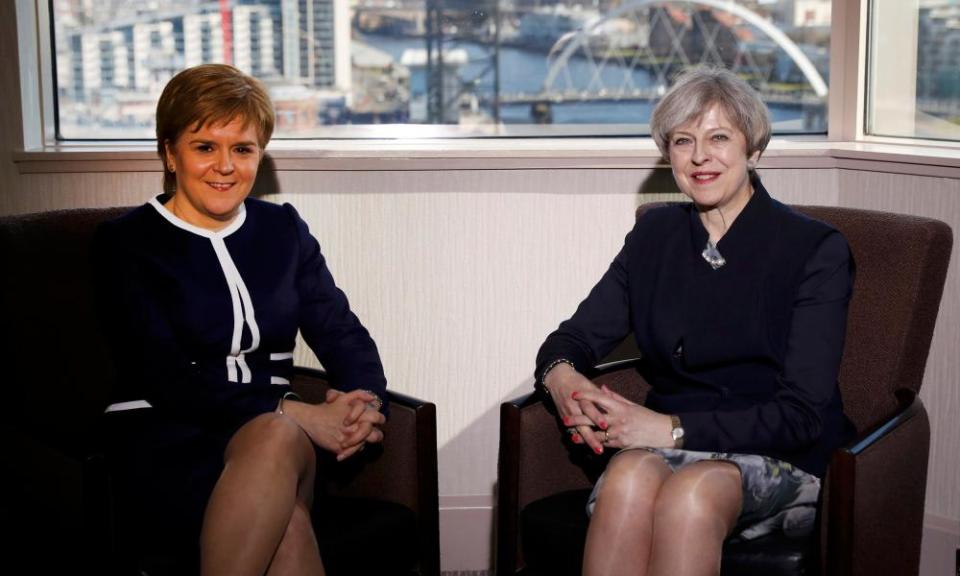Sturgeon says May’s Brexit timescale matches referendum plan
Nicola Sturgeon has said there is no longer any rational case against a second Scottish independence referendum after Theresa May told her that the full Brexit deal would be known within 18 months.
The first minister said May’s disclosure, during a meeting in Glasgow, closely matched the Scottish government’s timescale for calling a fresh referendum between autumn 2018 and spring 2019.
She said the prime minister was clear that the detailed terms of the UK’s divorce from the EU and the terms of its new free trade and immigration deal with the EU would be spelled out by autumn 2018.
“I think it makes it very difficult for the prime minister to maintain a rational opposition to a referendum in the timescale that I have set out,” Sturgeon told reporters after the meeting, which she said had been cordial and businesslike.
“The reason for now not being the time is that the terms for Brexit are not clear. Therefore if she’s saying to me today, as she was in very simple terms, that she believes the terms of Brexit will be clear before exit, and in time for EU ratification, then it seems to me she therefore has no basis for standing in the way of that timescale.”
Sturgeon said she was “at pains not to misunderstand” what May was saying about the timing for a Brexit deal and had pressed the prime minister to confirm that was her position.
She said she had reminded the prime minister that later this week she would be writing formally to ask the UK government to hand over the powers to stage a referendum in about two years’ time, but May had retorted that her position was clear: the UK government would not grant those powers until after Brexit was completed and the UK had left the EU.
Sturgeon is expecting to narrowly win a vote in the Scottish parliament on Tuesday approving her plans, including her timescale for the referendum, setting the scene for a fresh constitutional battle between the two governments.
She said she was surprised that May had not offered Scotland specific new powers after Brexit, despite media reports in advance of the prime minister’s visit. “The expectation that an offer we couldn’t refuse was going to be put on the table didn’t quite materialise,” Sturgeon said.

The Guardian understands that the UK government will attempt to seize back the initiative on Tuesday – just as Sturgeon opens the final day of debate on her referendum proposals – by publishing its first detailed offer for Scotland, setting out the areas where Holyrood is likely to gain new powers.
David Davis, the UK’s secretary of state for exiting the EU, will write to the Scottish government’s Brexit minister, Mike Russell, replying to Sturgeon’s white paper on Scotland and the EU that was published in December.
The Davis letter is expected to set out the areas where former EU farming, fishing, employment and trade powers will be reserved at UK level, the areas that will be devolved to Scotland and the areas where powers will be shared between the UK government and the three devolved administrations in Edinburgh, Cardiff and Stormont.
Sturgeon’s first meeting with May since the prime minister travelled to Edinburgh last July came after May had pressed the case for the defending and strengthening the union in a speech to civil servants in East Kilbride.
She told officials working for the Department for International Development that the different parts of the UK did “amazing things” together, making the UK one of the world’s most influential forces for good.
“So as Britain leaves the European Union, and we forge a new role for ourselves in the world, the strength and stability of our union will become even more important,” she said.
“This United Kingdom and the values at its heart are one of the greatest forces for good in the world today and when we work together and set our sights on a task we really are an unstoppable force.”
Sturgeon said the hostility that the UK government had shown to her proposal so far meant she could not see any circumstances under which she would withdraw her demand for a referendum.
She said May’s admission on the timing of a Brexit deal, which contradicts repeated warnings from other UK ministers that the negotiations could be far lengthier and complicated, meant the prime minister now had to agree on a timescale for a referendum.
“I’m not proposing that there should be an independence referendum now, but if you say now is not the time, it seems to suggest that you think there is a time and therefore that is the discussion the two governments should be having.”
The first minister said that given May was expected to resist demands for the powers to stage a referendum, she had other options open to her to make it possible, which she would soon set out to voters.
Scottish government sources have ruled out staging or supporting an unofficial referendum, however, knowing that would be boycotted by pro-union voters and risked being challenged in the courts.
A Downing Street source described the meeting between the pair as “courteous”, but No 10 said May had not agreed to the idea that a deal would be finalised within 18 months, and said the full facts would not yet be available by next autumn. “The prime minister simply discussed the two year timetable we have repeatedly set out,” a Downing Street source said, adding that it was Sturgeon herself who had raised the 18 month deadline.
May hopes to paint Sturgeon as an opportunist, determined to seize on any potential justification for holding a new poll, and No 10 is gambling that the Scottish public will agree with the prime minister that they will not have enough information in 18 months’ time to make a decision.

 Yahoo News
Yahoo News 
